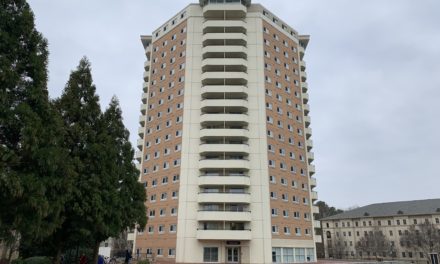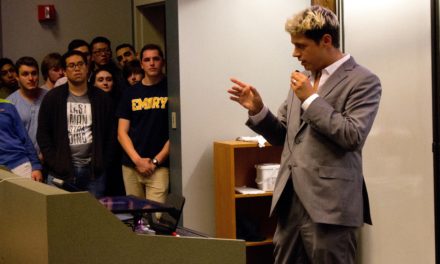A University committee has identified gender inequities in faculty salaries, “significant[ly]” low levels of faculty diversity and low faculty pay compared to peer institutions.
In 2013, then-Provost Claire E. Sterk charged the Class and Labor 2 Committee to examine the impact of social class among Emory faculty; Emory’s weaknesses as an employer; faculty recruitment; and the role of non-tenure track (NTT) faculty, according to Co-Chair of the Report Committee and Professor in the Department of Psychiatry and Behavioral Sciences Nadine Kaslow. The charge followed the Class and Labor 1 Committee’s 2013 report on the impact of social class on non-academic staff.
The committee, which is composed of 22 professors and administrators total from various divisions of the University, compiled a report of analyses and recommendations. The committee made a total of 43 recommendations across eight categories, including community and culture; diversity, inclusivity and equity; workplace expectations; recruitment and retention; and NTT faculty. The executive summary states that salary and recruitment data mostly pertain to tenure-track faculty due to a lack of NTT faculty data. The summary does not elaborate on the lack of data.
The Office of the Provost and Steering Committee denied the Wheel’s request for the full report. Chair of the Steering Committee and Professor of Nursing Deborah Bruner wrote in a Jan. 8 email to the Wheel that the full report is not yet publicly available because the Class and Labor 2 Committee will likely collect additional data before beginning the implementation process for certain recommendations. The Office of the Provost confirmed that only the executive summary is available at the moment.
The Class and Labor 1 Committee’s report was released in full January 2013.
Gender and Diversity
According to the executive summary, female faculty members at Emory occupy disproportionately fewer leadership roles and tenured positions than men and experience gender inequities in salary and perceived levels of “voice safety.”
“Women are socially punished more than men for asserting themselves, taking leadership positions and commanding … respect,” Goizueta Business School Assistant Professor of Organization and Management Erika Hall wrote in a Jan. 17 email to the Wheel. Hall, who researches the impact of race and gender on workplace interactions, explained, “This social punishment can come in the form of poor teaching ratings or lower appraisals for compensation recommendations.”
To combat disproportionate differences in salary, the committee recommended that the University create “salary equity committees” and “conduct regular salary appointment studies.” As of Fall 2017, those recommendations were under review by the Steering Committee, a group of faculty members and administrators tasked with assessing the recommendations and implementing changes.
The Report Committee also stated that deans should be held responsible for increasing faculty diversity in all tracks.
“Faculty diversity in terms of race/ethnicity is low in all schools/colleges and is increasing at unacceptably low rates especially given the changes in the student body,” the executive summary reads. “We consider it highly likely that implicit bias is an important factor in the failure to recruit a more diverse faculty.”
To address biases and inequities in voice efficacy, the committee recommended that Emory require implicit bias training for senior administrators.
Unconscious bias training works to decrease the effect of implicit associations on decision making, according to the Office of Equity and Inclusion website. As of January 2018, unconscious bias training is recommended but not required for Admission Committee members, who run student admissions; Administrative Units; and faculty search and appointment committees, according to Office of Equity and Inclusion Program Director Lynn Magee, a member of the Report Committee.
“Emory, I do believe, prioritizes things like diversity and inclusion, but I think we could still make progress in feeling that inclusivity and diversity and equity are values and prioritize [them] even more,” Kaslow said.
NTT Faculty and Compensation
In a 2016 Faculty Council meeting, Co-Chair of the Report Committee and Professor of Biology Gray Crouse explained that Emory and universities nationwide are beginning to hire a larger percentage of NTT faculty than tenure-track faculty and emphasized the need to pay NTT faculty more competitive salaries “that reflect their education and abilities,” according to the minutes from the October 2016 meeting.
President of Emory’s chapter of the American Association of University Professors (AAUP) Noelle McAfee, a philosophy professor and director of the Psychoanalytic Studies Program, said poor job security for NTT faculty is one of the most significant issues faculty members face.
“The fundamental problem is related to the lack of job security for contract labor on campus [and] inadequate pay,” McAfee said. “They’re paid a fraction of what other faculty members are paid and they work really hard. They teach more, they do more advising … so there’s a whole kind of class system.”
McAfee referenced Emory’s “Statement of Principles Governing Faculty Relationships,” also known as “The Gray Book,” which states, “faculty members should have security adequate for freedom to teach and to seek truth. This includes security of position after a reasonable period of probation, income commensurate with professional attainments, and assurance of explicit contract.”
Currently, “The Gray Book” states that contract renewal guidelines are determined by Emory’s individual schools and colleges.
“So far, the recommendations do not address the fundamental problem,” McAfee said, noting that Emory should develop more explicit contract renewal criteria for NTT faculty. “There could be legitimate reasons to have different classes of faculty, but it should be just and fair and transparent. There should be transparent policies so you know what you need to do to get your contract renewed.”
The report summary also states that faculty compensation at Emory is lower than compensation at peer institutions, even after adjusting for the cost of living.
“Despite Emory’s emphasis on recruiting and retaining excellent faculty, faculty salaries that can be compared are lower than in our peer institutions and have lost ground in the last decade,” the committee wrote in the summary. “This represents a severe barrier to attracting and retaining the best faculty.”
The Data
The Report Committee worked with Emory’s Office of Institutional Research to collect quantitative data like salary information, according to Kaslow. The Report Committee also conducted faculty surveys regarding perceptions of their employment, ran a series of focus groups and developed benchmark studies with other institutions, Kaslow said. The report’s recommendations were based on those data.
“[The report] was finalized in 2016 … it’s only now with the new provost that we’re sort of moving forward with it,” Kaslow said of the Phase 2 report.
Bruner told the Wheel in a Jan. 29 email that the data is a few years old and that some of the recommendations “may have already been partially implemented. … Each working group is free to make focused requests for data/information only as it is required to develop a fully informed action plan.”
McAfee expressed her frustration that the full report has not been released.
“What exactly is it that they’re still collecting?” McAfee said. “Why should we believe that?”
Chief of Staff and Associate Vice Provost Jennifer Hobbs wrote in a Jan. 22 email to the Wheel on behalf of Provost and Executive Vice President of Academic Affairs Dwight McBride, “Periodic updates on the committee’s progress will be made available to the community through the Office of the Provost website.”
The Class and Labor 2 Committee extended the research of the Class and Labor 1 Committee, which former Provost Earl Lewis and former Executive Vice President for Business and Administration Mike Mandl commissioned in 2010 as a response to student movements against employment practices at Sodexo, Emory’s former food service contractor. The France-based company, which has been criticized by non-governmental organization Human Rights Watch for violating American employees’ right to organize, prompted Emory administration to examine specific labor segments within the University.
nicole.sadek@emory.edu
Nicole Sadek (20C) is from Charleston, S.C., majoring in English and creative writing and international studies. Sadek previously served as editor-in-chief, social media editor, copy chief, managing editor, editor-at-large and editor-in-chief.





